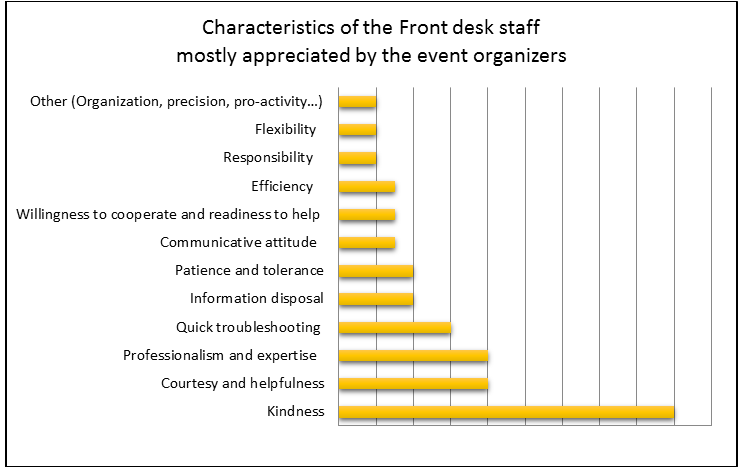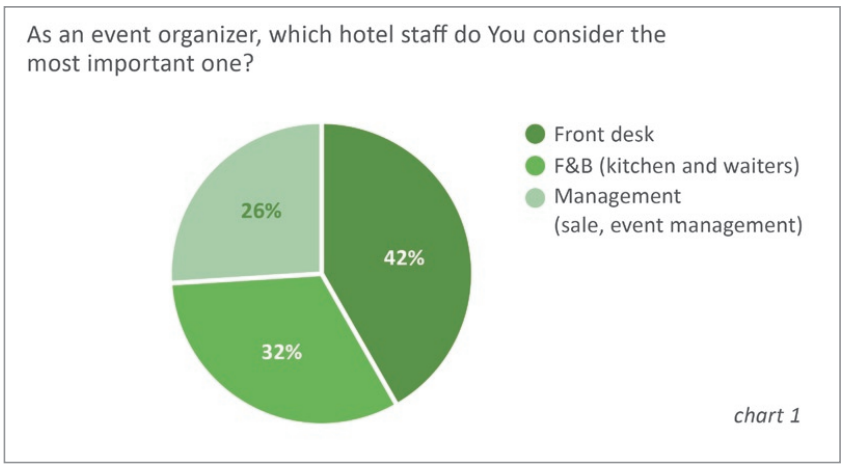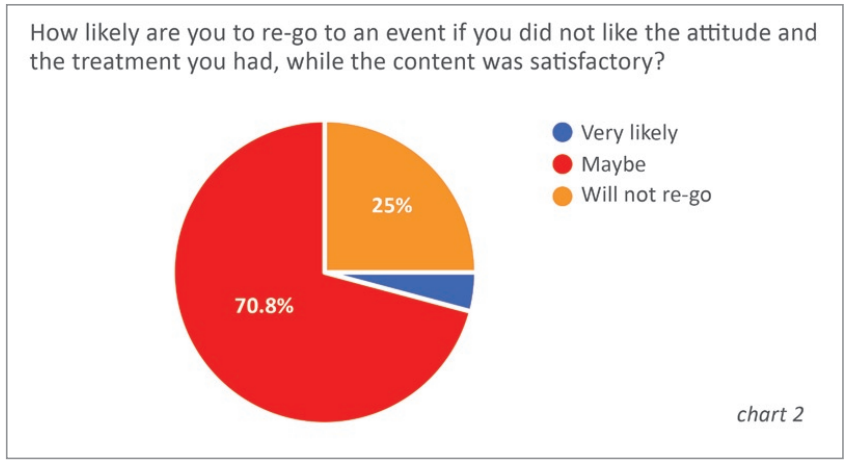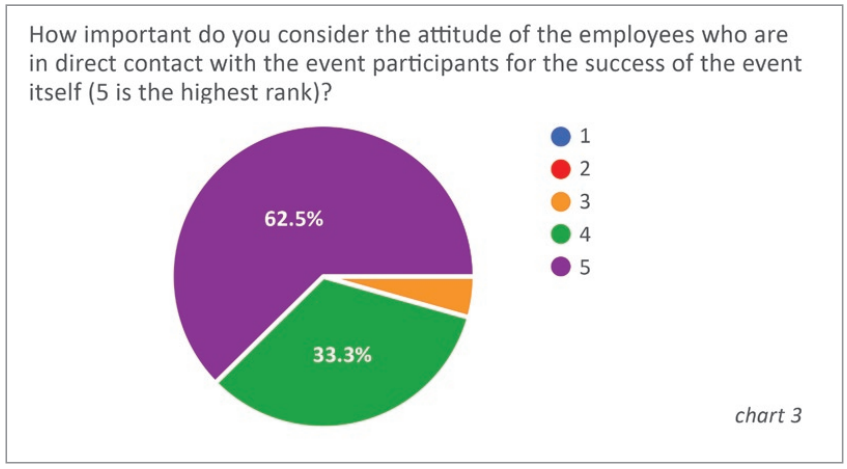In the second half of 2016 SEEbtm magazine has, among the event planners and representatives of hotels, facilities and agencies from the region of Southeast Europe, conducted a survey on the importance of employees who are in a direct contact with the participants, for the success of the event.
In the conducted survey, event professionals almost unanimously agree that the Front desk and the F&B sector in the hotel are the most important for the organization of the event, because of the direct contact they have with the guests/participants.
The importance of the Front desk and the waiters, as well as of the kitchen, was emphasized to the highest degree. Fewer survey participants, but still in a significant percentage (26%), ranked the management at the first place of importance for success of an – i.e. general management, sales management and event management (chart 1).
According to the survey, however, the content of the event itself has a great impact on the final impression of the participants. In fact, 70.8% of respondents shall consider re-going to the same event even if they did not like the attitude and the treatment they had, but the content was never the less satisfactory.
However, it is not a small percentage of participants (25% will not rego), which will harm the organizers due to the unsatisfactory treatment they had onsite (chart 2).
When asked how they find important the attitude of receptionists, waiters and other employees who are in direct contact with the event participants for the success of the event itself, 62.5% of respondents ranked the foregoing with the greatest importance, while 33.3% ranked it just below the highest importance (chart 3).
Accordingly, we can safely make a conclusion on a level to which the event organizers considered essential the behavior of employees towards guests / participants.
If the hosts appear to be hospitable, helpful, attentive and relaxed, experiences are always positive, according to information obtained from the survey participants.
Some examples of the positive staff contributions are those at the events where a large number of people meets for the first time, where the kind and relaxed staff contributed to a more relaxed and pleasant atmosphere, as well as those instances when guests return for the kindness of the waiters and the like.
Although most of the respondents state that those were mainly the positive experiences, there always appear the negative ones as well.
As an example, ignorance of the agreed conditions, delay in implementation of the agreement, disinterested approach to a client.
There were also cases when the communication in the chain was not a good one, having resulted in a transfer of misinformation or lack of transfer of changes which caused a client to get an impression of insecurity and lack of organization. According to the information provided by the survey participants, there were also the examples when the restaurant manager rudely refused to take the order because it was not his job, or when guests do not return simply because of the bad food.
Hotels and venues are an integral part of every event, therefore, it is important to consider and understand this matter from their point of view.
Namely, as stated by hotels, when the organization or the agency that communicates with the hotel about a specific event does not agree on all details in advance, but requests the changes on the site that can’t be quickly provided (i.e. the whole setting of the hall or technical equipment which was not scheduled) or when it requires extra services not envisaged or those services it doesn’t want to pay additionally, in such a case the hotel has to refuse such service to guests or make changes at the last minute which participants perceived as poor organization of the hotel, and not the one who negotiated the services.
Another bad example referred to is the one when a person that orders service announces the event for a significantly lower number of persons in comparison to those who appear to the event.
Then the participants make a conclusion that the hotel has not prepared enough food, which results in a bad image of the hotel. In any case, a detailed planning in due time is the matter of importance to be dealt with by every event organizer, in order to forestall any potential flaws or omissions.
Does the staff in direct contact with the participants can “fix” a situation? or even to “spoil” it?
If the managers do their jobs well, and the staff who welcome the participants don’t (or vice versa), the fact is that the job is not done properly. This will have an impact on the entire event and it reduces the possibility that someone will again decide to take a risk with the same supplier.

All participants in the survey agree that staff in direct contact with the participants can fix or spoil the situation, although most of the respondents highlights the positive impact that the staff can have on the event.
Kind staff, as pointed out by the survey participants, often make them feel more comfortable in places where they were not satisfied with the ambience or the content of the event.
“A smile, courtesy, professional attitude can improve many unforeseen situations (eg. sudden power failure, Internet drop). Likewise, when everything is impeccably organized, a rude waiter or receptionist can spoil the general impression.”








































 Srpski
Srpski English
English